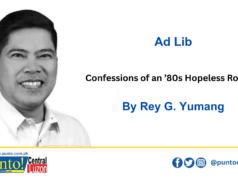I AM not surprised that John the Baptist was arrested, imprisoned, and eventually executed like a criminal. He was found in the same places which the rebels went to: the desert or the wilderness. In Tagalog they would say, NAMUNDOK SIYA. And not only that. He was also calling for a revolution. Except that he was not armed. He never brought any deadly weapon with him. He was armed only with one thing: THE WORD OF GOD. And he was calling for a different kind of revolution: a spiritual revolution. No wonder he got red-tagged.
In all regards, John the Baptist was supposed to be harmless. And yet he was thought by the authorities to be more dangerous than the real rebels. Why? Because he was openly challenging the powers-that-be. The Gospel writer in facts begins his story by enumerating the names of all the ruling authorities: Tiberius Caesar, the Roman emperor, Pontius Pilate the Roman procurator of Judea, Herod Antipas the governor of Galilee, Philip the governor of Iturea, Lysanias the governor of Abilene, and the chief priests of the Jerusalem temple Annas and Caiaphas. All these names had one common denominator: POWER. They were followers of the way of the world, the ones whom the writer of the book of Genesis calls the “builders of the tower of Babel.”
After introducing these powerful names, Luke says, “The Word of God came…” not to any of these powerful figures but “to John, the son of Zechariah.” Where? Not in the corridors of power—not in Rome or Jerusalem, and not even in the temple ruled by the Sadducees. The Word of God came to an obscure prophet who withdrew in solitude, IN THE DESERT.
John the Baptist proclaimed God’s Word in the desert, to remind Israel where they had come from before they entered the Promised Land. They had forgotten that they were once upon a time runaway slaves who had come from Egypt and had spent 40 years in the desert! It was there in the desert where the Lord had guided them to a different way, not the way of power. Isaiah called it THE WAY OF SALVATION, which “all flesh must see,” meaning—all human beings need to discover.
What is this “way”? It is the way of renewal, conversion, forgiveness, liberation, healing, inner transformation. In short, spiritual revolution. It is the way that is described by Isaiah, as quoted by Luke. To follow the Way of the Lord, John insisted that people to renounce the Way of the World. Jesus would later call it the way of the kingdom, of radical love, the way of the cross.
John the Baptist is borrowing from the prophet Isaiah to give practical tips on how to prepare the way of the Lord, how to build a highway for God. He describes the Word of God serving four different functions.
I checked out the major tools or tractors used by civil engineers for building good roads. Among them are bulldozers, loaders, rollers and trenchers. I imagine sort of modernizing the challenge of the prophet and calling the way of the Lord a kind of “SPIRITUAL ENGINEERING.”
First, it requires a lot of BULLDOZING. The Word of God comes like a tractor that demolishes pride and arrogance, which are the common reasons why people get deluded and learn to play god. Remember the story of that Syrian general who was afflicted with leprosy and who sought healing from the prophet Elisha? You find the story in Chapter 5 of the Second Book of Kings.
Because the prophet Elisha did not even come out to greet him personally, his pride was hurt. And when the prophet sent a message that all he needed was to immerse himself seven times in the murky water of the river Jordan, he felt even more insulted. He had come with the king’s endorsement and with a lot of gold and he would be treated this way? He was behaving like a spoiled brat, about to stage a walk-out.
He did not realize that the prophet was doing this deliberately, to demolish his arrogance, the source of his disease. Of all people, it was a slave girl who brought him to his senses and said, “What harm will it do you, sir, if you swallow your pride a little bit and do what he asks of you?” When he finally listens, the writer tells us he was not only healed; his skin became like that of a little child!
Second, the way of the Lord requires a lot of LOADING work. Engineers use backhoes and payloaders in order to do landfilling. They have to fill up the gaps. The low places have to be raised or elevated. This is what the Lord did through Moses when he lifted up the Hebrews from a life of slavery to a life of freedom. He raised their dignity. Even the Blessed Mother said this in her Magnificat. Remember how she said, “He will bring down the mighty from their thrones and raise up the lowly.” This is the salvation brought about by the Word of God. It requires a lot of levelling and equalizing. Why? Because we live in a very unequal society!
Thirdly, building a highway for the Lord requires the use of TRENCHERS. Why? That is how they straighten the crooked ways. You work on the curves and bends by building canals and drainages on the sides. This is why the Lord gave Israel the ten commandments. People tend to get used too quickly to crooked ways. Corruption is an attitude that soon becomes a culture, a way of life. It is the way of the devil who loves to lead us to bends and curves in order to mislead us.
Finally, spiritual engineering requires the use of ROLLERS and GRADERS. It is hard to bike or ride a car on a road that is bumpy and full of potholes, isn’t it? The graders and the rollers will do that job of compacting, refining and finishing. What we do with roads we do with children and young people don’t we? That is why parents educate their children in good manners and right conduct. Sometimes we call it good breeding—trimming down some rough edges: in thought, word, and deed.
There you are. You can take them home with you for the rest of your Advent preparation. Let the Word of God do the spiritual engineering in us—bulldoze pride and arrogance, raise up the lowly, straighten cooked ways, and smoothen the rough ways. Advent invites us to do as John did—to find time to go into solitude and listen to the voice in the wilderness. To immerse in in the murky waters of our humanity in order to be reborn into the new humanity of Jesus Christ, the Way, the Truth and the Life.
(Homily for 2nd Sunday of Advent, 5 December 2021, Lk 3:1-6)





